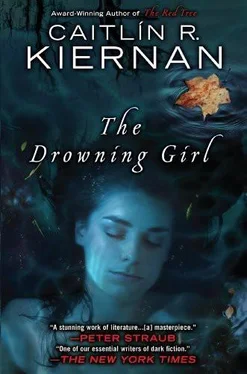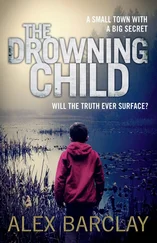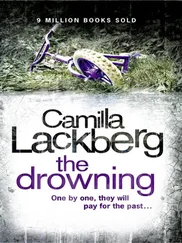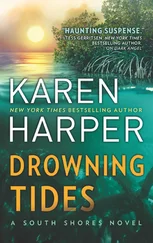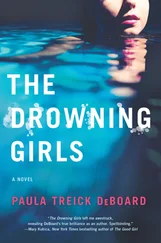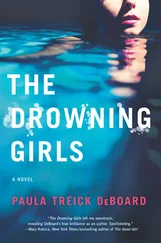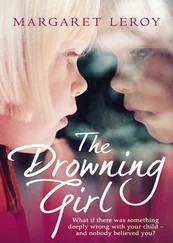Caitlín Kiernan - The Drowning Girl
Здесь есть возможность читать онлайн «Caitlín Kiernan - The Drowning Girl» весь текст электронной книги совершенно бесплатно (целиком полную версию без сокращений). В некоторых случаях можно слушать аудио, скачать через торрент в формате fb2 и присутствует краткое содержание. Год выпуска: 2012, ISBN: 2012, Издательство: Roc / New American Library, Жанр: Фэнтези, на английском языке. Описание произведения, (предисловие) а так же отзывы посетителей доступны на портале библиотеки ЛибКат.
- Название:The Drowning Girl
- Автор:
- Издательство:Roc / New American Library
- Жанр:
- Год:2012
- ISBN:978-0-451-46416-3
- Рейтинг книги:5 / 5. Голосов: 1
-
Избранное:Добавить в избранное
- Отзывы:
-
Ваша оценка:
- 100
- 1
- 2
- 3
- 4
- 5
The Drowning Girl: краткое содержание, описание и аннотация
Предлагаем к чтению аннотацию, описание, краткое содержание или предисловие (зависит от того, что написал сам автор книги «The Drowning Girl»). Если вы не нашли необходимую информацию о книге — напишите в комментариях, мы постараемся отыскать её.
The Drowning Girl — читать онлайн бесплатно полную книгу (весь текст) целиком
Ниже представлен текст книги, разбитый по страницам. Система сохранения места последней прочитанной страницы, позволяет с удобством читать онлайн бесплатно книгу «The Drowning Girl», без необходимости каждый раз заново искать на чём Вы остановились. Поставьте закладку, и сможете в любой момент перейти на страницу, на которой закончили чтение.
Интервал:
Закладка:
“I sang for me,” she said, and I sat on the bed, watching the butterscotch light on her face. “I sang you, and drew your song from you. I kept my promise.”
“Do you think she’s waiting?” I asked. “Your mother, I mean,” and she didn’t answer me. I wanted to tell her I loved her. I wanted to beg her to be with me forever, to strangle me in her bathypelagic reveries she’d only allowed me to briefly glimpse. I wanted to implore her to teach me metamorphosis, that I might coil and peer at the world through shark-black eyes. Please teach me the witchcraft , I thought, so I can call the anemones and crabs, the octopuses and starfish. Stay and always be my sister, my lover, my teacher, my dissolution . My thoughts were bright as the rising sun, and she heard them all. Or she only guessed.
“No,” she whispered. “I’ve given as much as I may.”
That’s when I remembered my Moonstone dreams from July, dancing hand in hand to “The Lobster Quadrille” while Eva fiddled. But I kept them to myself. I went to the bathroom, brushed and flossed my teeth, used deodorant, and peed. My reflection, in the mirror on the medicine cabinet door, my reflection surprised me, but only a little. I’d lost weight, and my skin was sallow, and there were dark circles beneath my eyes.
Small price to pay, I silently told myself.
“I’m ready,” I said, stepping back into the bedroom. Eva was still standing at the window. At last she turned away from the coming day. And I think, I almost am certain, that she said something about Aokigahara Jukai, but she was speaking so quietly, and I didn’t ask her to repeat herself.
We left the house, left the city, and I took the Broad Street exit onto I-95 to South County. I had to find my sunglasses, the sun so bright on my left. The day was bright, the sky blue as blue ever is, no clouds at all. Eva found a radio station playing classical music, and…
“Don’t stop now,” Imp typed.
Full fadom five thy MOTHER lies,
Of HER bones are Corrall made:
Those are pearles that were HER eies
Nothing of HER that doth fade,
But doth suffer a Sea-change
Into something rich, & strange:
It takes us less than an hour to reach Moonstone Beach. I exit the interstate at…no, no sense in a blow-by-blow travelogue, is there? I left the interstate and drove south to the sea. I drove south, to the sea. The windows were down, and the air was sweet with the perfume of growing things. I drove, and we passed the picturesque rural pageant below I-95: the Kenyon Grist Mill (circa 1886, 1695) and fields of tall, dry cornstalks, forests and bracken and pastureland, fieldstone walls scabbed with moss and lichen, horses, and cows, and goats, trees so huge I imagine they must have been planted or taken root before the Revolutionary War, a handful of houses (some old and dignified, some new and shoddy), and a wide plot of Queen Anne’s lace, their white flowers rustling lazily in the morning breeze. Ponds, and streams, and small bogs. A time or two, I wanted to pull the Honda over, to show Eva some thing or another. But I didn’t. Back on Willow Street, she’d said, “We need to leave soon. I’ve put it off too long already.”
She wouldn’t want me to stop, so I didn’t ask. I tried not to ask questions I already knew the answers to; Rosemary taught me not to do that.
By seven o’clock (I had to stop for gas, or we’d have gotten there sooner), we’d reached the sandy cul-de-sac, the turnaround at the end of Moonstone Beach Road. On one side, the west, the turnaround is flanked by Card Pond, and on the other side, the east, it’s flanked by an impenetrable thicket, interlaced with stunted trees, and then Card Pond. I parked on the Card Pond side, and warned Eva to be careful of poison ivy when she got out, as it grows everywhere near the beach. I didn’t know whether or not she was allergic, but I’m awfully allergic to poison ivy. So cautioning her was reflexive. She hadn’t worn shoes, after all. Eva smiled, opened the door, and got out of the car.
We stood there, with the car between us, for…for not too long. I spotted two swans on the pond and pointed them out to her. She nodded and said, “The dying swan, when years her temples pierce, In music-strains breathes out her life and verse. And, chanting her own dirge, tides on her wat’ry hearse.”
Who are hearsed that die on the sea?
“Did you just make that up?” I asked.
“Hardly,” she said, and laughed, but it was in no way an unkind or mocking laugh. “An English poet, Phineas Fletcher. He wrote it.”
“Well, it’s beautiful,” I told her.
“Not as much as the swans,” she replied.
“No,” I agreed, “not that beautiful.”
A gust of wind rippled the tea-colored surface of the pond, and one of the swans spread its wide wings.
“We shouldn’t linger,” she said then, and I followed her from the Honda down the trail of gray sand leading to the beach. We crossed the culvert that connects the two ponds. The tide was going out, so water was gurgling into Card Pond through the concrete pipe beneath us. There are only two or three lines of dunes dividing the salt ponds from the beach. The dunes were festooned with dog roses and the aforementioned poison ivy. That morning, there were the delicate pink and white dog roses in bloom, and still a few drooping scarlet rose hips that hadn’t shriveled and dropped to the ground.
“Make it short,” Imp typed. “We shouldn’t linger.”
I also type.
The air smelled of the sea, and of the dog roses. Beyond the dunes, Moonstone Beach is almost always very, very windy. The wind whipped madly through Eva’s long hair. The wind was colder than I’d expected it to be, and I wished I’d brought a sweater. The air was so clear that morning, I could plainly make out the silhouette of Block Island, ten miles to the south. The beach was, as always, littered with seaweed and cobbles and pebbles: granite, slate, calcite, schist, and the opaque white moonstone for which the beach was named. The sea was calm, and only very low waves, ankle-high, rolled in and broke against the shoreline. The air was filled with herring gulls, a few of the larger black-backed gulls, and sleek cormorants streaking past.
No, Caroline. There were no crows, or ravens, or black birds of any sort.
Eva bent down and picked up a perfectly rounded moonstone, about the size of a chestnut, and she placed it in my hand, then closed my fingers around it.
“You can sing now, India Morgan Phelps,” she said. “I wish your songs weren’t going to cause you so much pain.” And then she placed a hand on either side of my head and kissed me, and Eva tasted no different from any human woman I’ve ever kissed.
When our mouths parted, I said, “Let’s go home.”
Her bottle-blue eyes stared into my eyes. She didn’t smile, and she didn’t frown. I don’t know a word for the expression that had settled over her face. Maybe the word is calm .
“No, Imp. That’s not the way your ghost story ends,” she said so softly I could hardly hear her voice over the wind. “That’s not the way my ghost story ends, either.”
And then the woman I knew as Eva Canning, daughter of Eva Canning, did what her mother had done seventeen years before. Eva turned away from me, and she walked into the sea. At first, the waves broke about her ankles, then about her thighs, soaking her red dress, red as rose hips. Then she swam a little ways. And then she was gone. I thought, Love is watching someone die.
I sat down on the beach and held the moonstone she’d given me. I sat there a long, long time, shivering and listening to the gulls.

Back Pages
Интервал:
Закладка:
Похожие книги на «The Drowning Girl»
Представляем Вашему вниманию похожие книги на «The Drowning Girl» списком для выбора. Мы отобрали схожую по названию и смыслу литературу в надежде предоставить читателям больше вариантов отыскать новые, интересные, ещё непрочитанные произведения.
Обсуждение, отзывы о книге «The Drowning Girl» и просто собственные мнения читателей. Оставьте ваши комментарии, напишите, что Вы думаете о произведении, его смысле или главных героях. Укажите что конкретно понравилось, а что нет, и почему Вы так считаете.
